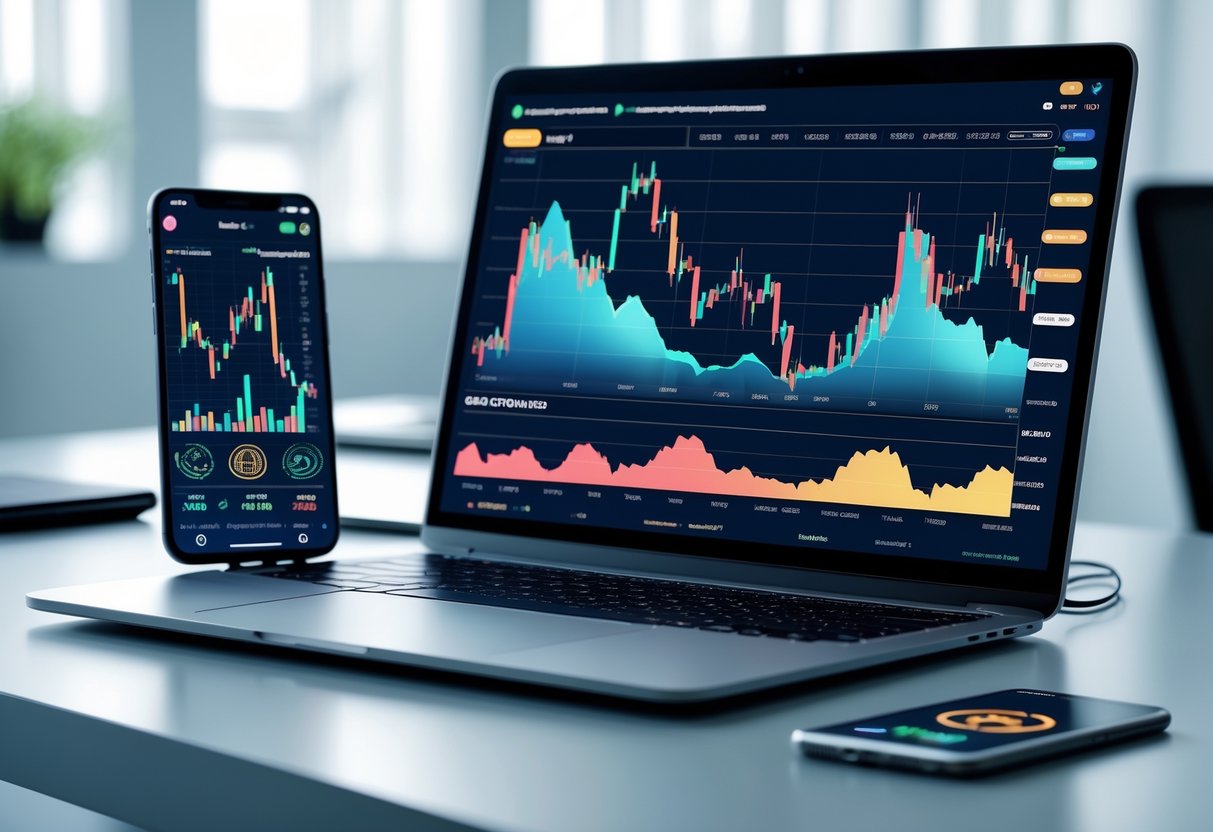
Crypto portfolio trackers have become essential tools for investors navigating the complex world of digital assets. These platforms help users monitor their cryptocurrency investments in one place, providing real-time updates on prices, performance, and market trends. As tax regulations around digital assets grow stricter, these trackers also assist with maintaining accurate records needed for compliance.

See Rewards Linked to This Topic—Follow Steps to Get:
Great news—exclusive perks are just a few steps away! Follow these simple actions to unlock bonuses linked to this topic!
How It Works (Fast & Easy!)
1️⃣ Check Your Rewards in Seconds
→ Click Here to See How Much You Qualify For (No commitment!)
First-time withdraw can unlock 7K+ USD.
2️⃣ Connect Your Wallet
Use any mobile or desktop wallet (MetaMask, Trust Wallet, etc.)—approved in seconds!
3️⃣ Cash in Your Pocket in 15 Minutes!
Get your funds fast—no credit checks, no waiting.
Why This is a Game-Changer 💎
✔ Each month there is a free offer reward for all users.
🔥 Limited-Time Offer – Claim Your $7K+ Now!
👉 Get Instant Access Here
No hidden fees. No credit checks. Just fast cash against your crypto! – and this is not a financial advice.
A good crypto portfolio tracker offers features like customized alerts, tax reporting tools, and compatibility with multiple exchanges. In 2025, investors have numerous options to choose from, with many trackers supporting thousands of cryptocurrencies and offering mobile applications for on-the-go monitoring. The best trackers balance comprehensive features with user-friendly interfaces that don’t require technical expertise.
Selecting the right crypto portfolio tracker depends on your specific needs as an investor. Important factors to consider include the range of supported coins, exchange compatibility, security features, and whether the platform offers free access or requires a subscription. With approximately one million people worldwide now using these tools, crypto portfolio trackers have become a standard part of digital asset management.
What Are Crypto Portfolio Trackers?

Crypto portfolio trackers are specialized tools that help investors monitor and manage their cryptocurrency investments in one place. These digital platforms collect data from various exchanges and wallets to provide a comprehensive view of your crypto assets.
Key Features of Crypto Portfolio Trackers
Crypto portfolio trackers offer several essential features that make them valuable for investors. Most trackers provide real-time price updates, allowing you to see current values of your holdings without checking multiple platforms. This real-time tracking is crucial in the volatile crypto market.
Performance analytics is another key component. Good trackers show profit and loss calculations, both in percentage and fiat currency terms. They also display historical performance charts so you can visualize your investment journey over time.
Many portfolio tracker apps include customizable alerts and notifications. These alert you about price movements, market opportunities, or security concerns. Some advanced trackers also offer tax reporting features, helping you maintain records for tax compliance as regulations around digital assets become stricter.
Types of Supported Assets
Modern crypto portfolio trackers support a wide range of digital assets. Beyond mainstream cryptocurrencies like Bitcoin and Ethereum, quality trackers monitor thousands of altcoins and tokens. The best platforms support over 13,000 crypto assets with accurate pricing data.
Many trackers now include support for:
- Major cryptocurrencies
- DeFi tokens
- NFTs (Non-Fungible Tokens)
- Staked assets
- Tokens on multiple blockchains
This comprehensive asset tracking allows investors to monitor diverse portfolios across different blockchain ecosystems. Some advanced trackers even support traditional investments like stocks or precious metals, creating a unified view of your entire investment portfolio.
How Portfolio Tracking Works
Portfolio tracking works through API connections or manual input methods. Most trackers connect to exchanges and wallets via secure API keys, automatically importing your holdings and transactions. This creates a real-time, accurate picture of your cryptocurrency investments across multiple platforms.
For privacy-focused users, many trackers offer manual input options. You can enter transaction details yourself without connecting accounts directly. The portfolio management system then calculates current values based on market prices.
Behind the scenes, these tools use data aggregation to pull information from various sources. They combine exchange rates, transaction histories, and market data to calculate portfolio value and performance metrics. Advanced trackers also factor in complex situations like staking rewards, airdrops, and token swaps to maintain accurate records of your crypto journey.
Top Crypto Portfolio Trackers and Apps

Choosing the right crypto portfolio tracker can make a significant difference in managing digital assets effectively. The best platforms offer a balance of comprehensive tracking features, security, and user-friendly interfaces across mobile and desktop environments.
Overview of Leading Platforms
The crypto tracking landscape in 2025 features several standout portfolio trackers. CoinStats remains one of the most versatile options, supporting connections to multiple exchanges and wallets. Its popularity stems from its comprehensive coverage of cryptocurrencies and in-app token swap capabilities.
CoinMarketCap and CoinGecko offer excellent free-to-use tracking solutions that appeal to beginners and experienced investors alike. These platforms provide robust market data alongside basic portfolio tracking.
For users who need to track both crypto and traditional assets, Kubera and Delta stand out. They enable investors to monitor stocks alongside their digital holdings, creating a unified view of diverse investments.
CoinTracker has established a strong reputation for tax reporting features, while Koinly specializes in tax compliance across multiple jurisdictions.
Platform-Specific Features
The best crypto portfolio trackers differentiate themselves through unique capabilities. The Crypto App excels with its home screen widgets, allowing users to monitor their investments without opening the application. This mobile-first approach works particularly well in the Apple ecosystem and Android environments.
CoinTracking offers advanced analytical tools for serious traders, including profit/loss calculations and tax reporting across over 13,000 cryptocurrencies. Their historical performance analysis is especially valuable for long-term investors.
CryptoCompare provides exceptional comparison tools that help users evaluate different assets side by side. Meanwhile, Altrady and Coin Market Manager focus on active traders with features like multi-exchange trading and strategy analysis.
Here’s how some top trackers compare on key features:
| Platform | Free Plan | Tax Features | Exchange Connections |
|---|---|---|---|
| CoinStats | Yes | Basic | 300+ |
| Delta | Yes | Limited | 300+ |
| CoinGecko | Yes | No | Manual import |
| Koinly | Limited | Advanced | 350+ |
User Experience and Interface
User interface quality varies significantly among crypto portfolio trackers. Delta receives high marks for its clean, intuitive mobile application design that works seamlessly across iOS and Android devices. Its visual representation of portfolio performance makes data interpretation straightforward.
CoinStats offers a balanced user experience that appeals to both beginners and experienced traders. The dashboard presents essential information without overwhelming users.
Crypto.com‘s tracking app provides a streamlined experience that integrates well with their broader ecosystem. Their mobile app makes portfolio monitoring on-the-go particularly convenient.
Some platforms like CoinTracking sacrifice some interface simplicity for functionality. While powerful, these platforms may present a steeper learning curve for newcomers to crypto investing.
Platform Security and Privacy
Best crypto portfolio trackers prioritize security given the sensitive nature of financial data. CoinStats and Delta use read-only API connections to exchanges, minimizing vulnerability to unauthorized transactions.
Kubera implements bank-level security protocols and doesn’t store actual cryptocurrency keys. They use encryption for all data transmission and storage.
Privacy policies vary significantly between platforms. Some trackers like CoinGecko allow anonymous usage without requiring personal information for basic features. Others like CoinTracker collect more user data but provide stronger verification and recovery options.
Two-factor authentication (2FA) is standard among reputable trackers. Crypto Pro takes security further with biometric authentication options on mobile devices.
Users should carefully review privacy policies before granting access to their exchange accounts or wallet information.
Advanced Functionality and Analytics

Modern crypto portfolio trackers offer sophisticated tools that go beyond basic tracking. These platforms provide deep insights into market trends, automate notifications, and visualize data through interactive charts to help investors make informed decisions.
Real-Time Market Data and Price Tracking
Crypto portfolio trackers deliver real-time market data that updates automatically as prices change. These tools connect to multiple exchanges simultaneously, providing unified access to price information across the entire cryptocurrency market.
Most advanced trackers display current prices alongside historical data, allowing users to see how values have changed over time. This real-time price tracking helps investors spot trends and identify potential buying or selling opportunities.
Some platforms offer additional market data including:
- Trading volumes
- Market capitalization
- 24-hour price changes
- Bid-ask spreads
- Order book depth
The best trackers refresh data frequently—some nearly instantaneously—ensuring investors always have the most current information before making decisions.
Notifications and Price Alerts
Price alerts are essential features that notify investors when cryptocurrencies reach specified price thresholds. These notifications can be customized based on percentage changes, specific price points, or market conditions.
Investors can typically receive alerts through:
- Push notifications
- Email alerts
- SMS messages
- In-app notifications
Advanced trackers allow users to set complex conditions for alerts. For example, you might create an alert that triggers when Bitcoin drops 5% while Ethereum rises 3% simultaneously.
Some platforms offer smart notifications that analyze market trends and automatically suggest potential actions. These AI-powered alerts can identify unusual market movements or trading opportunities that might otherwise go unnoticed.
The best notification systems strike a balance between providing timely information without overwhelming users with constant updates.
Interactive Charts and Performance Analysis
Interactive charts transform complex data into visual representations that make portfolio performance easier to understand. These analytics tools enable investors to visualize price movements, portfolio growth, and asset allocation at a glance.
Advanced trackers offer customizable time frames, allowing users to analyze performance across different periods—from hours to years. This flexibility helps identify both short-term opportunities and long-term trends.
Most platforms include comparison features that measure portfolio performance against benchmarks like Bitcoin or the overall market. This context helps investors determine if their strategy is outperforming or underperforming.
Chart types commonly available include:
- Line charts for price history
- Candlestick charts for detailed price action
- Pie charts for asset allocation
- Bar graphs for comparative performance
The most sophisticated analytics tools incorporate technical indicators like moving averages, RSI, and MACD to provide deeper insights for technically-minded traders.
Security, Pricing, and Tax Reporting
When choosing a crypto portfolio tracker, three critical factors deserve your attention: security measures to protect your assets, pricing models that fit your budget, and tax reporting tools that keep you compliant. The best platforms balance these features to provide comprehensive portfolio management.
Account Security and Privacy
Crypto portfolio trackers handle sensitive financial data, making security features essential. Most reputable trackers offer two-factor authentication (2FA) to prevent unauthorized access. This extra layer of security requires both your password and a time-sensitive code.
Privacy options vary between platforms. Some trackers only require read-only API keys from exchanges, which cannot execute trades on your behalf. This significantly reduces risk compared to platforms requiring full access credentials.
Look for trackers with:
- End-to-end encryption
- Secure data storage practices
- Clear privacy policies
- Regular security audits
Many premium services like Koinly and Delta provide 24/7/365 security monitoring to detect suspicious activities. Some platforms also offer additional protection through manual entry options that don’t require connecting to exchanges directly.
Cost and Pricing Models
Crypto portfolio trackers range from free basic services to premium subscription models. Free trackers typically offer limited features, such as tracking a small number of wallets or exchanges, basic portfolio overviews, and minimal tax reporting capabilities.
Subscription-based trackers usually operate on tiered pricing models. For example:
- Basic plans ($5-15/month): Track multiple wallets, basic reporting
- Premium plans ($15-30/month): Advanced analytics, unlimited wallets
- Professional plans ($30+/month): Tax optimization, investment strategies
Some platforms like CoinMarketCap offer completely free tracking services but may have limitations on functionality. Others like Koinly provide free portfolio tracking with paid tax reporting starting at $59 per year.
The cost often correlates with the number of transactions, connected exchanges, and reporting features. Consider your portfolio size and complexity when choosing a pricing tier.
Tax Reporting and Compliance
Tax reporting is becoming a crucial feature in crypto portfolio trackers. Leading platforms can automatically calculate capital gains based on various accounting methods (FIFO, LIFO, HIFO) to optimize your tax position.
Comprehensive tax tools like Koinly generate complete tax reports, including:
- Capital gains summaries
- Transaction histories
- Income reports from staking or mining
- Forms compatible with tax filing software
Look for trackers that support tax-loss harvesting strategies, which can help minimize tax liabilities. The best tax reporting tools can handle complex situations like DeFi protocols, staking rewards, and cross-chain transactions.
Many trackers integrate directly with tax software or generate reports in formats accepted by tax professionals. This feature becomes increasingly valuable as regulatory scrutiny of cryptocurrency investments grows.
Frequently Asked Questions
Crypto portfolio tracking comes with several common challenges and considerations. These practical questions address key aspects of portfolio management from asset tracking to security and tax reporting.
How can I track multiple cryptocurrency assets in one place?
Crypto portfolio trackers make it possible to monitor various cryptocurrencies in a single dashboard. Most platforms allow you to add assets manually or connect to exchanges via API keys.
You can view your entire crypto holdings across different wallets and exchanges, eliminating the need to log into multiple platforms. This centralized approach helps investors maintain a clear overview of their diversified investments.
What features should I look for in a crypto portfolio tracker?
The best crypto portfolio trackers offer comprehensive market data, performance analytics, and customizable alerts. Look for platforms that support a wide range of cryptocurrencies and exchanges.
Advanced features might include portfolio diversification insights, real-time price updates, and historical performance tracking. Mobile accessibility is also important for monitoring investments on the go.
Security features like two-factor authentication and data encryption should be non-negotiable priorities when selecting a tracker.
Are there any reliable free crypto portfolio tracking tools available?
Free crypto portfolio trackers with solid functionality exist for investors with basic tracking needs. Platforms like CoinMarketCap, CoinGecko, and CoinStats offer free tiers with essential tracking capabilities.
These free options typically include basic portfolio monitoring, price alerts, and market data. However, they may limit the number of transactions or portfolios you can track compared to paid alternatives.
Is it possible to integrate my crypto portfolio tracker with exchanges and wallets?
Crypto portfolio trackers commonly offer integration with major exchanges and wallets through API connections. This allows automatic synchronization of your holdings and transactions.
Most trackers support popular exchanges like Binance, Kraken, and Coinbase. The integration process typically involves generating API keys from your exchange account and entering them into your tracker.
Some platforms also support wallet address monitoring for assets stored in hardware or software wallets.
How do I ensure the security of my data when using a crypto portfolio tracker?
Security for crypto portfolio trackers should include read-only API access when connecting to exchanges. This prevents the tracker from making transactions on your behalf.
Choose trackers that implement strong encryption, two-factor authentication, and have clear privacy policies. Avoid sharing private keys or seed phrases with any tracking application.
Regular security audits and a proven track record of protecting user data are also important indicators of a trustworthy tracker.
Can I use a crypto portfolio tracker to generate tax reports and transaction histories?
Many crypto portfolio trackers now include tax reporting features to simplify compliance. These tools can generate transaction histories, calculate capital gains, and produce tax-ready reports.
Some platforms offer integration with specialized crypto tax software like CoinTracker or Koinly for more complex tax situations. The quality of tax reporting varies between trackers, with premium services typically offering more comprehensive solutions.
Keep in mind that accurate tax reporting depends on complete transaction data, so it’s important to maintain consistent tracking throughout the tax year.
Leave a Reply